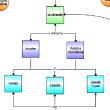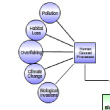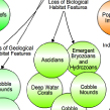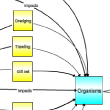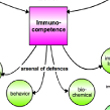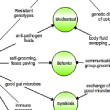Faculty/Graduate Student Collaborative Workshop at Northeastern University
Workshop Theme: Ocean-Climate Connections |
|
Held at Northeastern University Marine Science Center in Nahant, MA
Tuesday, April 24 through Thursday, April 26, 2012 |
|
|
|
Click on the Images to Learn More About the Scientists Who Attended this Workshop |
|
Ocean-Climate Connections Revealed with Faculty/Graduate Student Team-Building
|
|
| Click images for enlarged views |
On April 24th - 26th, COSEE-OS, in collaboration with the Northeastern University (NU) Marine Science Center (MSC), hosted a Graduate Student/Faculty
Collaborative Workshop at the MSC in Nahant, MA. Working in small groups, three NU faculty (Professors Matt Bracken, Jon Grabowski and Rebeca Rosengaus)
collaborated with nine marine science graduate students to learn new skills for communicating to general audiences the “big picture” messages found in their
diverse research topics.
The first day of the workshop focused specifically on working with participating research faculty (i.e., "professor-level professional development"). The
faculty received an overview of how concept mapping as an educational tool could be used to deconstruct their complex science and communicate with new
audiences. Faculty members created concept maps based on their own research and learned how their topics tie into multiple Ocean Literacy Fundamental
Concepts. These maps covered topics including the importance of biodiversity, ecological impacts of commercial fisheries, and behavior of social insects.
During day two, faculty presented these maps to and received critical feedback from the nine graduate students, and then worked with them to further refine
these maps to target the knowledge-base of a typical high school audience. On the third day, graduate students presented the refined maps to a group of
Swampscott High School students, who in turn provided ‘realistic’ feedback to the graduate students on the use of appropriate jargon, content, and overall
presentation skills (and everyone knows that high schoolers are not apt to mince words!)
After the high schoolers departed for a "VIP" MSC tour, graduate students discussed with facilitators how the workshop content and tools could be useful
to their graduate research efforts. Valerie Perini, one of the graduate student participants voiced her reflections in a blog post-workshop, "I think it
is easy to fall into a pattern of how I perceive and present my own research, and concept mapping might be a great tool to discover new ways of looking
at my project that had never occurred to me. I am excited to create maps to help me organize my project for writing my thesis and also to provide a quick
and attractive tool to share my research with others." (quote used with permission of V. Perini).
The workshop, modeled after a series of graduate student workshops, was developed by COSEE-OS with the goal of improving graduate student communication of
complex science topics using concept mapping. The workshop at NU was funded by a year-long mini-grant from the New England Ocean Sciences Education
Collaborative (NEOSEC) in partnership with COSEE-OS to encourage collaborative approaches to fulfilling scientists' Broader Impacts requirements. Carole
McCauley (NUMSC Education Director) is the PI on this grant.
Next steps in the project: Over the summer and early autumn, the NU graduate students will undertake concept mapping of their own research, and
gathering/producing multimedia "assets" with which to populate the "background" of the maps. These "assets" will include things such as pictures, videos,
charts, journal articles, and other reference material aimed at helping viewers to learn more and/or interpret more deeply the meaning of relevant sections
of the concept map. These interactive maps will be linked from the MSC's website to help visitors understand more about the Center's work and about the
graduate student experience in general. If you have any questions about the workshop, MSC, or the NEOSEC grant, please contact
Carole McCauley
for further information.
Concept Maps
(Click images for enlarged views)




